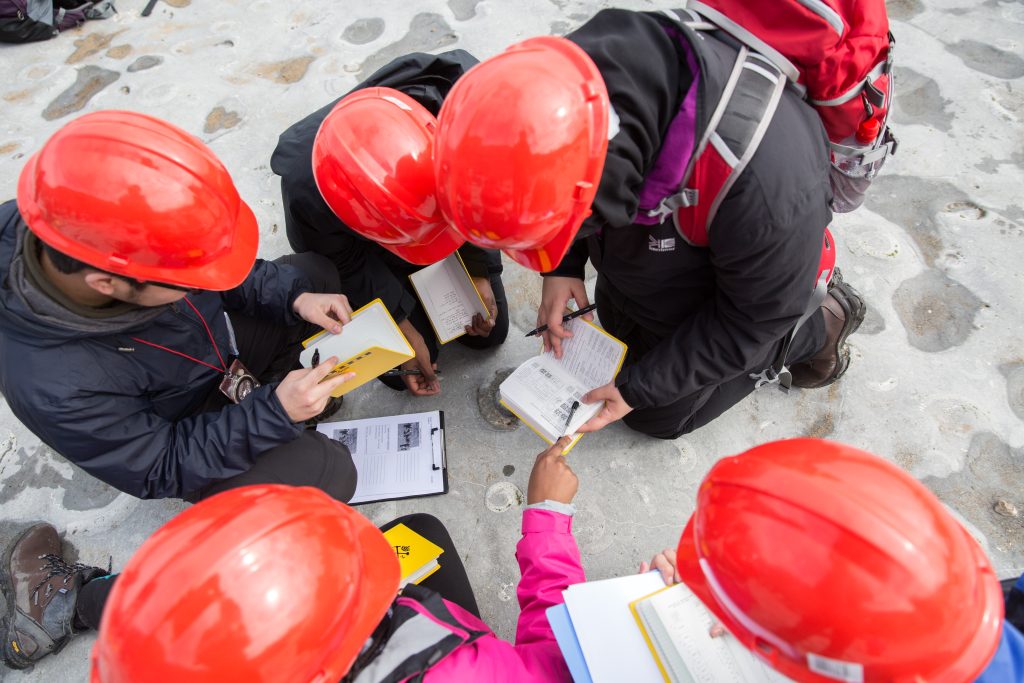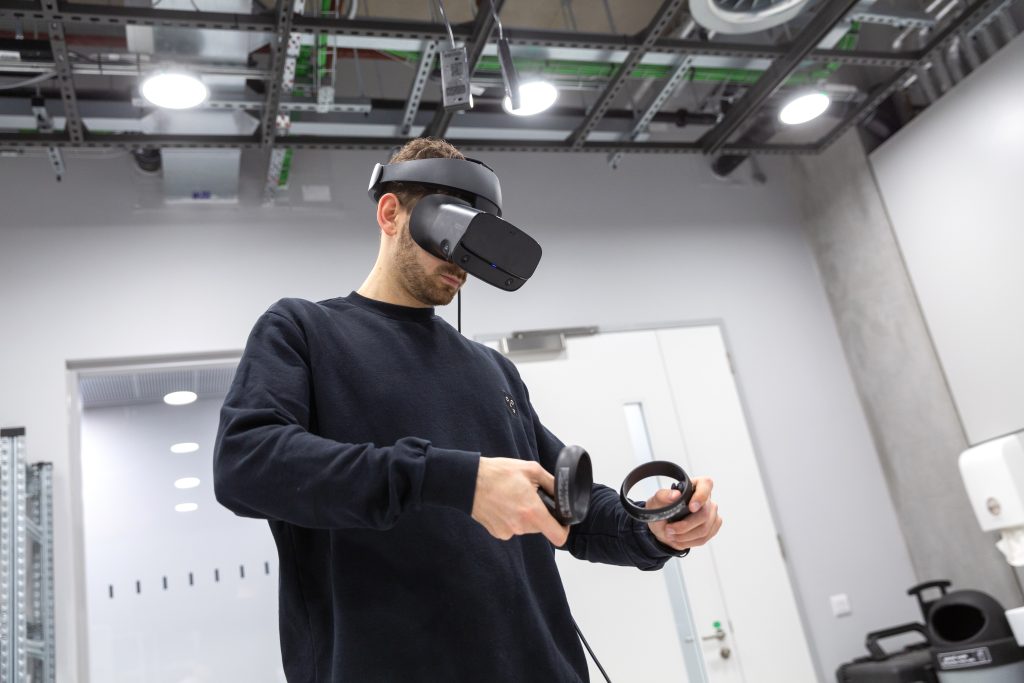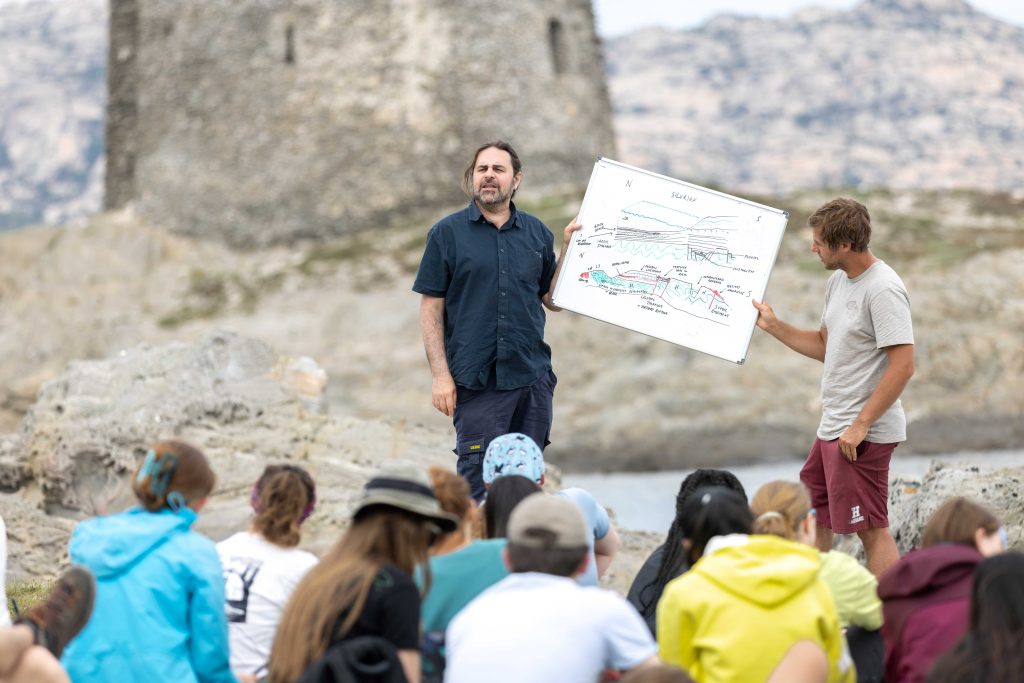
Fieldtrips are a cornerstone in geology pedagogy. Traditionally, studying a degree in Earth Science involves travelling to different locations, often abroad, to study rocks and landscapes first-hand.
“Outdoor fieldtrips give students the chance to examine rocks, landscapes and structures first-hand—cementing the textbook concepts we study in class,” says Dr Valentin Laurent, Senior Teaching Fellow in Pedagogic Transformation at the Department of Earth Science and Engineering (ESE) at Imperial.
But, while exciting and inspiring, fieldwork can also pose risks, be expensive, and present a significant barrier for students with disabilities or health issues. As Dr Valentin Laurent explains, using virtual reality (VR) can remove some accessibility barriers, while also taking fieldwork to a whole new level.
“Not only can students be taken to Greece, Italy or Spain to learn about volcanoes – they could also go on a fieldtrip to Mars, or to the Earth’s mantle, and learn to understand geological structures by experimenting with their formation in 3D.
“In this way, VR technology opens entirely new opportunities for learning-by-doing – delivering educational benefits in terms of enhancing engagement and understanding. While VR also brings its own set of challenges, it holds the potential to revolutionise our approach to fieldwork, creating a more inclusive learning environment.”
Bringing geology fieldtrips to life through VR
During the COVID-19 pandemic, outdoor fieldwork became challenging. This led Dr Mark Sutton, Reader in Palaeontology at ESE, to develop a VR technology formerly known as the ESE Remote Classroom (ESERC) back in 2020. This technology is now on its way to becoming an innovative large-scale and fully networked classroom VR platform for Imperial, currently known as ViRSE.
Last year, Dr Valentin Laurent and Dr Matthew Genge worked with ESE students to explore how successful this sort of VR-based technology is at bringing geology fieldtrips to life in a more accessible way.
The research evaluated virtual fieldtrips to Sardinia, Scotland and South Wales organised by ESE, which were run in 2020 as emergency replacements for planned trips cancelled due to the COVID-19 pandemic.
Using the then-called ESERC 3D simulation software, researchers at ESE created interactive virtual environments based on real fieldtrip locations. The software allowed students to virtually navigate different areas like cliffs and quarries, and to virtually perform tasks like mapping areas, identifying folds and faults and recording observations.

Analysing the success of VR-based fieldtrips
To understand how successful these VR-based fieldtrips were from a pedagogical perspective, researchers at ESE combined questionnaire data and open-ended responses from two groups of undergraduate students who had experienced both traditional outdoor fieldwork and virtual fieldwork.
The first group of students participated in a virtual fieldtrip to Sardinia during their third year, while the second group experienced a virtual fieldtrip to South Wales and Scotland.
The findings, published in the Journal of Geoscience Education, suggest that while outdoor fieldwork is valuable, VR can successfully recreate some of these field trips remotely and could supplement learning experiences while also improving inclusivity.
The survey revealed that almost half of the students (42.3%) in the first group agreed they had faced some problems with outdoor fieldwork relating to accessibility in the past. While 92.3% said outdoor fieldwork is crucial when studying Earth Science, 65.4% felt it excludes certain groups.
The second group had more concerns about the exclusivity of outdoor fieldwork – with 72.2% agreeing that fieldwork was exclusionary. In terms of accessibility problems, 27.8% of group two students reported experiencing accessibility issues in the past, although 89% maintained that outdoor fieldwork is vital to an Earth Science degree.
Students from group one noted that VR-based technology led to some challenges: 42.3% experienced technology issues and 69.2% reported difficulty in asking questions. Despite this, 96.1% of students found the interactive 3D virtual environments beneficial. While 65.4% of students in group one did not prefer virtual fieldwork over outdoor fieldwork, 52% agreed it effectively replicated the field experience.
The second group had a more positive view of virtual fieldwork – with 38.9% of students agreeing that they would like fully virtual fieldwork options in the future, compared to 26.9% for group one. Additionally, almost three quarters (72.2%) of group two students felt that the VR fieldtrip adequately replicated the experience they would have in the field.

Striking a balance between outdoors and virtual fieldwork
“Our study shows that despite positive experiences with the virtual fieldwork, students did miss being physically present with classmates and teachers, and they valued opportunities to practically apply theoretical skills through outdoor fieldwork” explains first author Louise Guillaume, who obtained her BSc at ESE and is currently a PhD student at the Department.
While ESE doesn’t intend to put an end to traditional fieldtrips, which bring a great wealth of value to students, implementing some virtual field learning could really benefit accessibility and supplement occasional residential trips – especially when cost or health are barriers for students.
“Even if the majority of students will willingly participate in outdoor fieldwork, this is not true for every student and personal situations can change. Virtual fieldwork can offer an alternative where traditional fieldtrips are not accessible. Fieldwork should be able to impart benefits to students regardless of their circumstances” concludes Louise Guillaume.
“Our research shows VR’s potential to make fieldtrips more accessible. We have demonstrated the feasibility of remote fieldwork, and we intend to expand offerings to improve inclusivity of our degree programs,” adds Dr Valentin Laurent.
In the coming years, the team at ESE will work to expand the use of VR – aiming to integrate virtual elements into course aims to make BSc degrees welcoming to people facing barriers to hands-on access.